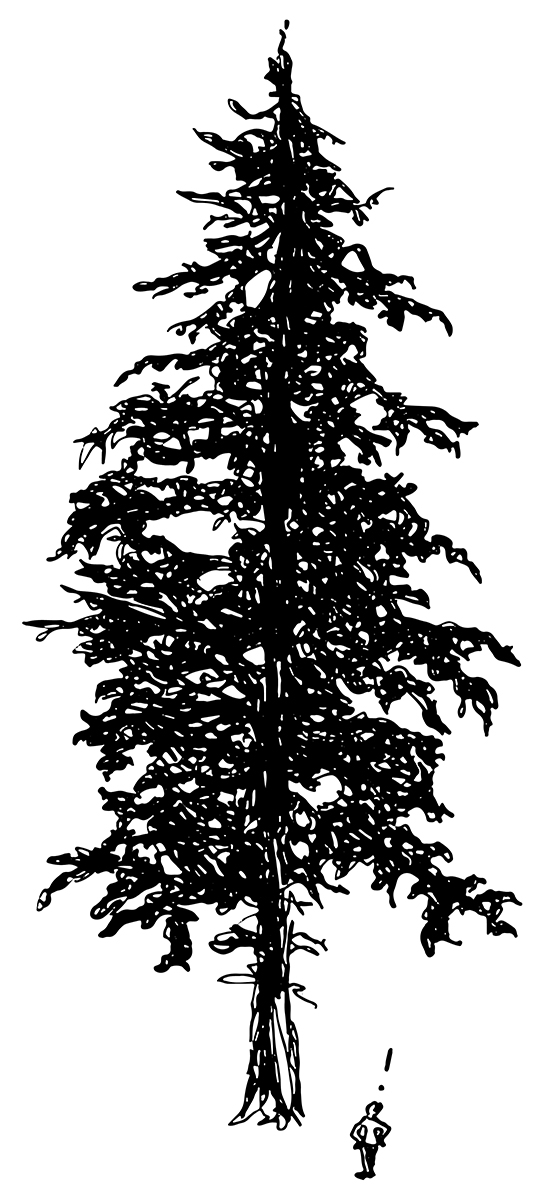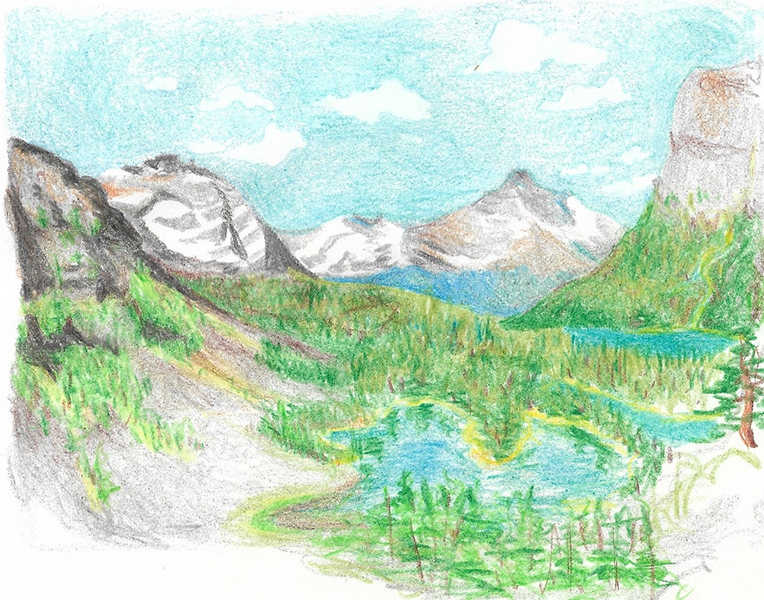Situated in the heart of the heavily-forested Fraser Valley, it makes sense for UFV to be introducing a new Environmental Studies program next semester. Students were able to enroll for the Bachelor of Environmental Studies degree for the first time this Fall semester. Headed by Michelle Rhodes, the environmental studies program will include the Bachelor of Environmental Studies (BES) and the Bachelor of Environmental Studies (Natural Sciences), the latter of which will be offered for the first time in the coming Winter semester.
The program has been 12 years in development, and was first proposed in the 1980s. Rhodes became involved in 2007, joining the Environmental Studies Curriculum Committee, who started the processing of courses to include in the degree. It was a hefty task, since the program includes courses from multiple disciplines including statistics, economics, agriculture, geography, English, biology, and philosophy. With the growing threat of climate change, it was important that this program address issues of a changing environment, and Rhodes is hoping to see it grow even more.
“It has a lot of space for growth as we bring on new faculty. The climate emergency really demands that we’re responding to not just that crisis, but the plastics crisis, the biodiversity crisis — we’re in a time of ecological crisis,” said Rhodes. “So the goal is that this degree program, the two degrees, will provide that opportunity for new curriculum development that will respond to that.”
Rhodes has been the driving force behind the fruition of the program. She explained that there was a large demand to focus on a stronger science component, which led to the BES (Natural Sciences) degree. This is in slight contrast to BES, which has a broader and more arts-focused base. The two degrees are different, but have a common core which includes base knowledge in things such as environmental ethics and professional competency.
Since it’s important for students to develop experience in the field they’re interested in, Rhodes said students will be encouraged to do co-operative work terms, join practicums, and develop their professional experience.
The program will serve as an opportunity for students who want to focus on environmental studies, but don’t want to be funneled into larger universities such as Simon Fraser University or the University of British Columbia. It’s important for UFV to offer this to local students, especially as our changing society and environment demands a response to multiple environmental crises.
Rhodes hopes to see more environmental courses develop from different fields of study, so the committee’s devised a way for professors to get involved in expanding the program and offering their knowledge to students.
“We have a seminar course that is open to faculty from across the institution to teach into, if it’s an environmental theme. So it creates some opportunities for faculty to do some new course development if they want to go in that direction,” said Rhodes.
People are realizing more and more that their livelihoods are intertwined with the world around them; the future job field will have a heavier focus on sustainability and a need to understand the environment. The program will fill a much needed gap in UFV’s programming and options for students and faculty wanting to explore more on this topic.
“I really wanted my education to be engaged in change-making. I know that was something that all of us around the table, on the committee, shared,” said Rhodes.
Rhodes wants the program to be a diverse place where students can bring their life experience and interests into their education.
“We’re just as happy to have people who maybe aren’t your strongest students academically, but who bring incredible real-world experience. So whether that’s sitting in a tree or measuring that tree for forestry, those are people who bring in environmental knowledge through different contexts and lenses and perspectives. Creating a program where that is really just integrated into the form of learning was exciting.”

One of the classes that Rhodes is looking forward to is “Environmental Studies 200: Bioregional Communities.” Rhodes said that the course will explore living sustainably in a given bio-region.
“Whether that’s here or in northern Alberta or in the Toronto area, what are the tools that you need, what are some of those questions you need to ask [to live sustainably in your bio-region].”
Rhodes explained that it was important for the program to develop courses that were decolonized and included Indigenous knowledge, and to work towards the decolonization of all courses.
“The Western perspective of how knowledge is generated and owned is hyper-colonial. So we really needed somebody in geography or environmental studies who brought that different perspective.”
Rhodes explained that the program recently hired Stefania Pizzirani as an assistant professor, who has specialties in environmental geography and Indigenous research.
“There’s been some conscious decisions over the last several years in multiple departments so that it’s not just, okay, you take a course in Indigenous studies, but that your courses across the board are decolonized. We’re not to a point where we can say all of our courses are fully Indigenized or anything like that — that’s going to take a long time — but we can start decolonizing.”
Rhodes said that she’s excited about several of the interdisciplinary courses that will be offered with the new program. This includes a course that has yet to come to full fruition surrounding issues of ethical fashion, and a course called “Planting for Reconciliation,” which will include studies of traditional native plant use and students will work on the development of the Shakespeare garden at UFV’s Chilliwack campus. The Shakespeare garden was designed to pay homage to playwright, William Shakespeare, and the plants mentioned in his plays. The garden will also include the deliberate planting of native B.C. plant species and is intended to be a symbol of reconciliation as both Shakespearian plants and Indigenous plants cohabitate.
Students have expressed interest to both Rhodes and Trevor Carolan, an English professor who’ll be sticking around after retirement to teach an eco-literature course under the new program next semester. Like Rhodes, Carolan thinks an environmental program is needed at UFV, specifically to address student demand.
Carolan received a letter from one of his students, Amanda Carvalho, who was interested in the Beat Generation, Zen spirituality, and environmentalism to inform her future career as a high school counselor.
“Future teens will face issues that will be specific to their generation and, likewise, counsellors will require tools specific to their issues. Central issues may involve the stress-inducing threat of a growing climate emergency,” Carvalho wrote in the letter.
Carolan’s been a part of the development committee for the environmental program for nearly six years and will be leading a class that will address some of these concerns, called “Identifying ‘Valleyness’: The Deeper Loam.” It will be a senior workshop that focuses on eco-literacy and eco-literacy issues, specifically concentrating on the Cascadia and Fraser Valley region. Students who are a part of the class will work toward compiling a small book of writing based on their research during the semester, with a focus on what makes the Fraser Valley culturally distinct. The class will take place in three-hour sessions on Thursdays, is open to students of all backgrounds, and will include field trips, films, and guest speakers.
He explained that the idea came to him when he discovered two cultural atlases from the publishing company Sasquatch Books.
“I saw these two other books called Seattleness and Portlandness. Those are two pretty hip towns in America. Everybody wants to live in Seattle or Portland these days. Seattle’s got coffee culture and Portland’s got craft beer culture — they’re both really great cities. Somebody just put together a compendium of the things that make Seattle unique, they started writing up the different components that made Seattle, Seattle. I thought what about the Valley? There’s so much here and it’s changing. We’ve got about half a dozen wineries going now and so many small breweries; there’s the return to people growing hops again in the Valley, for craft breweries.”
Compiling the “Valleyness” chapbook would give students an opportunity to engage in cultural mapping in the Valley, and would provide an opportunity for students to get to know the area more.
The reading list for the class includes writers from the Beat Generation, a literary movement from the 1950s whose authors explored cultural themes, especially surrounding spirituality and freedom of expression. Some of the authors on the list worked in and around the Pacific Northwest, including Jack Kerouac and Gary Snyder. Carolan explained that these writers will provide a base for cultural exploration in his class.
“The West Coast Beat writers were always grounded very much in a sense of place; that was always part of it. There was always that very close tie to Indigenous thought and culture, which they borrowed from liberally, and helped shape what we call the environmental movement.”
In the same way these writers captured pieces of their environment and preserved it through writing, so too does Carolan want to capture and preserve pieces of the Fraser Valley through the development of the chapbook. Whether or not it’ll be an ongoing project hasn’t been decided, but either way, it’s a great way for students to build up their portfolio while exploring the Valley, and it’ll be an invaluable contribution into the archives of local history.
For students interested in learning more about the program, and/or who have questions about getting involved, there will be a drop-in information session on Thursday, Nov. 14 from 1 – 3 p.m. in B133.
Illustrations/Drawing: Renee Campbell/The Cascade
Darien Johnsen is a UFV alumni who obtained her Bachelor of Arts degree with double extended minors in Global Development Studies and Sociology in 2020. She started writing for The Cascade in 2018, taking on the role of features editor shortly after.
She’s passionate about justice, sustainable development, and education.



